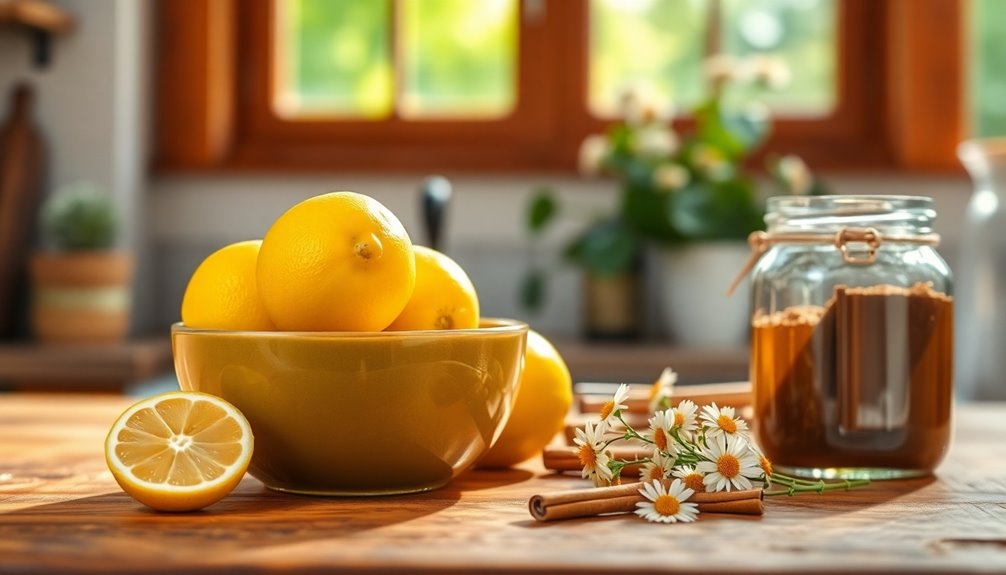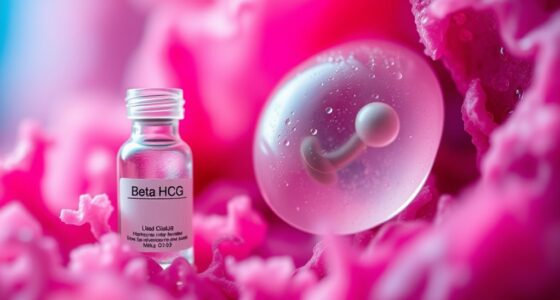You'll be amazed at how simple kitchen ingredients can lighten your hair naturally! Stuff like lemon juice, chamomile tea, and raw honey work wonders without harsh chemicals. These methods are not only cost-effective, but they also keep your hair healthy and vibrant. Just remember to take precautions to avoid dryness and protect your locks from sun damage. Stick around to discover the top techniques and tips for achieving stunning results at home!
Key Takeaways
- Lemon juice, when applied before sun exposure, acts as a natural bleaching agent for light or blonde hair.
- Strong chamomile tea combined with lemon juice can effectively lighten brunette hair while conditioning it.
- Raw honey mixed with cinnamon and olive oil offers a gentler lightening method suitable for all hair types.
- Apple cider vinegar, when blended with chamomile tea and lemon juice, helps maintain hair health and balances pH.
- Sun exposure enhances natural lightening effects, but it's essential to monitor time to prevent hair damage.
Natural Lightening Ingredients You Can Find at Home
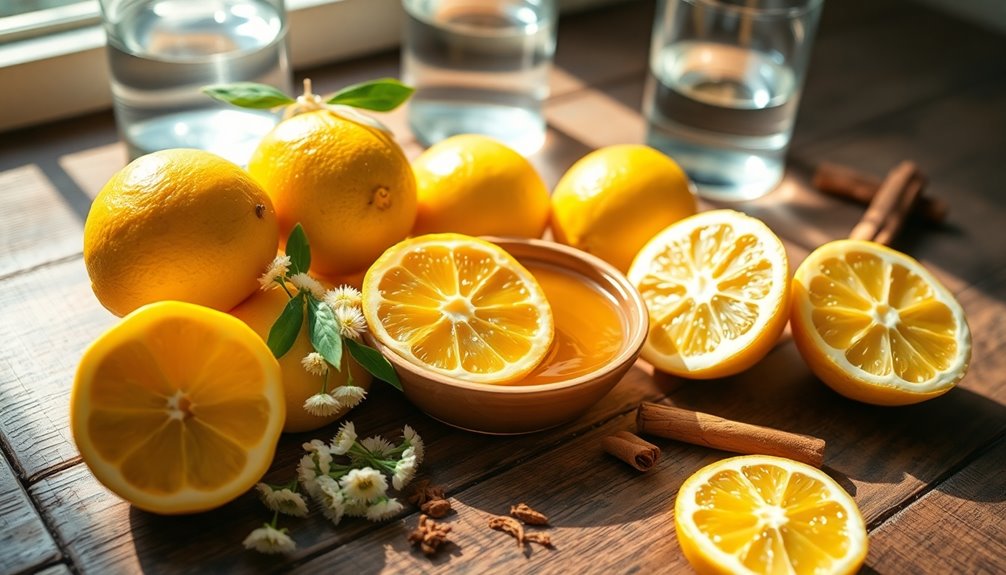
When it comes to natural hair lightening, there are five effective ingredients you can easily find at home.
First up is lemon juice; it's a natural bleaching agent that works best on light or blonde hair. Mix 2 tablespoons with 1 cup of water and apply it before sun exposure for enhanced results.
Chamomile tea is another great option. Brew it strongly, mix it with lemon juice, and it'll lighten brunette hair while conditioning it.
Brew strong chamomile tea, mix with lemon juice, and watch brunette hair lighten while it conditions beautifully.
Raw honey, combined with water, creates hydrogen peroxide, making it effective when left on damp hair.
Don't forget apple cider vinegar, which balances pH and can be mixed with chamomile tea and lemon juice.
Finally, honey and cinnamon together enhance lightening effects while conditioning your locks.
Benefits of Using Natural Hair Lighteners
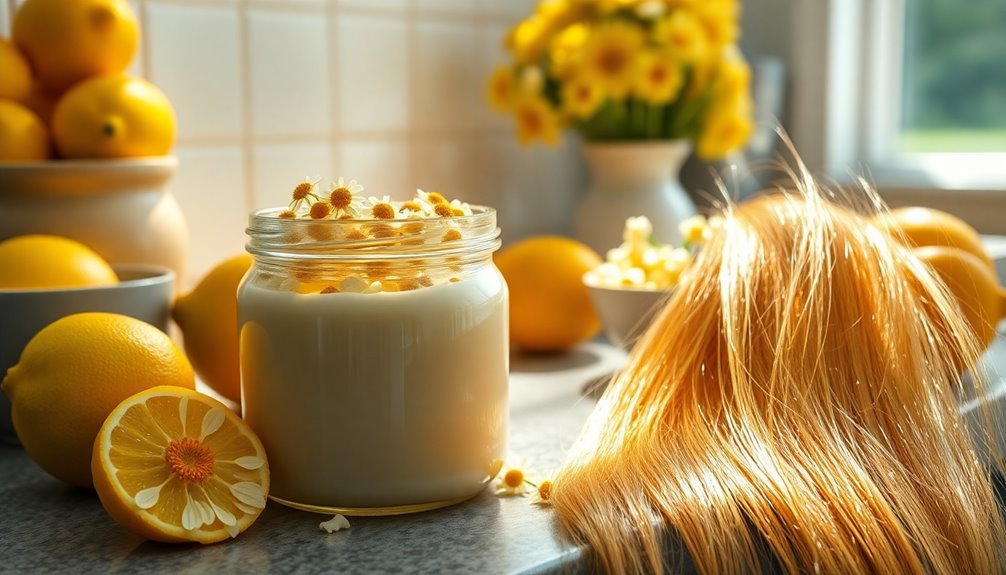
Using natural hair lighteners offers you healthier alternatives to harsh chemicals, helping to maintain your hair's integrity.
They're also cost-effective, as you can easily find ingredients right in your kitchen.
Plus, by reducing chemical exposure, you lower the risk of irritation and allergies, making it a safer choice for your hair and scalp.
Healthier Hair Alternatives
Natural hair lighteners offer a healthier alternative to commercial products, prioritizing your hair's well-being.
By using methods like lemon juice and chamomile, you can achieve beautiful natural highlights without the harsh chemicals that often damage your hair.
Ingredients such as raw honey and apple cider vinegar provide gentle lightening while conditioning your locks, preventing dryness and breakage.
With consistent use, you'll notice gradual results that keep your hair strong and shiny, unlike chemical dyes that can lead to long-term damage.
Embracing these healthier hair alternatives not only enhances your color but also supports overall hair health, allowing you to lighten your hair naturally and safely.
Cost-Effective Solutions
While many people seek brighter hair colors, opting for natural lightening methods can be a budget-friendly choice.
Natural hair lighteners utilize common kitchen ingredients, making them both accessible and cost-effective compared to pricey salon treatments.
Here are some benefits of using DIY solutions:
- Minimal cost with pantry staples like lemon juice and honey
- Gentle lightening process that reduces the risk of hair damage
- Gradual results, allowing you to control the lightening process
- Customizable techniques tailored to your hair type and preferences
- They can be paired with best purple shampoos to maintain color vibrancy and reduce brassiness.
Reduced Chemical Exposure
When you choose natural hair lighteners, you greatly reduce your exposure to harsh chemicals often found in commercial products.
By using gentle ingredients like lemon juice, honey, and chamomile as your lightening agents, you minimize the risk of skin irritation and respiratory issues.
These natural methods not only help you naturally lighten your hair but also promote healthier strands.
Unlike chemical options that can leave your hair stiff and brittle, natural lighteners often nourish and condition your hair.
Plus, they lessen potential long-term health risks associated with chemical dyes, such as occupational eczema and concerns about malignancy.
Embracing natural hair lightening is a safe, effective way to brighten your look without compromising your health.
Popular Natural Hair Lightening Methods
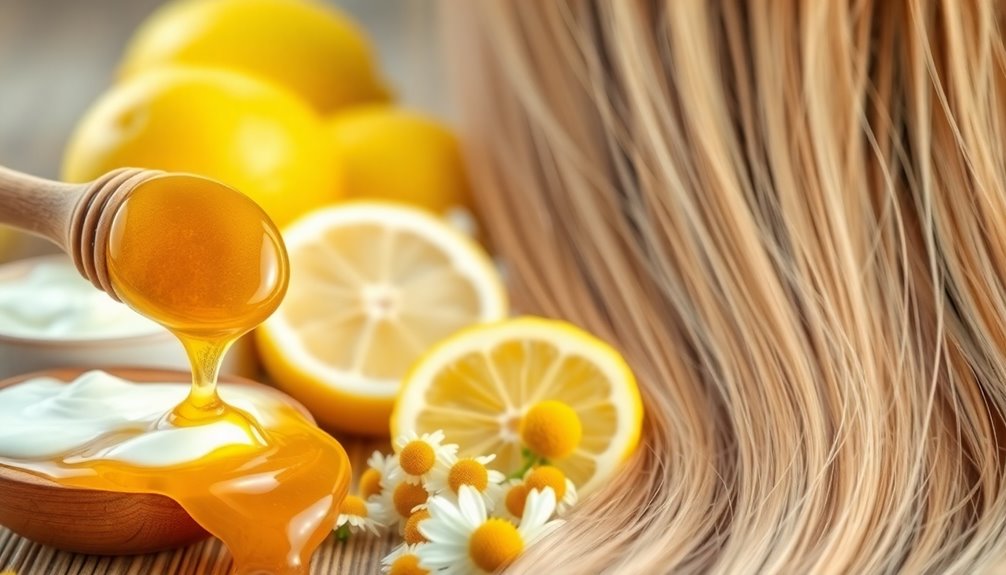
Several popular methods can help lighten your hair naturally at home.
These natural lightening methods are easy to follow and can enhance your hair color without harsh chemicals.
Here are some effective options:
- Lemon Juice: Mix 2 tablespoons of lemon juice with 1 cup of water, apply before sun exposure.
- Chamomile Tea: Brew strong chamomile tea, mix with lemon juice, and let dry in the sun.
- Raw Honey: Combine honey with cinnamon and olive oil for a gentler lightening effect.
- Apple Cider Vinegar: Mix with chamomile tea and lemon juice for conditioning and lightening benefits.
Experiment with these methods to find the one that works best for you, and enjoy your naturally lighter locks!
Precautions to Take When Lightening Hair Naturally
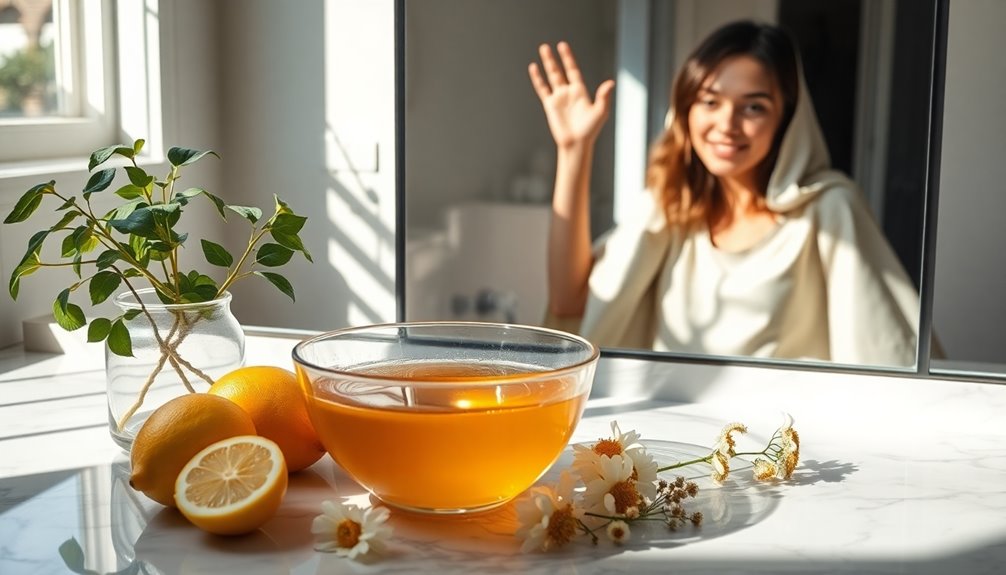
Before you lighten your hair, always start with a strand test to avoid any unwanted allergic reactions.
Keep an eye on your hair's condition during the process, as natural methods can still cause dryness.
Plus, it's smart to avoid getting the lightening agent on your skin to prevent irritation.
Strand Test Importance
Although you might be enthusiastic to lighten your hair naturally, conducting a strand test is essential to confirm safety and effectiveness. This simple step helps you avoid potential mishaps when you decide to lighten hair at home.
By applying your chosen method to a small amount of hair, you can:
- Assess color results before full application
- Identify any allergic reactions or irritations
- Gauge the effectiveness on your specific hair type
- Prevent unexpected outcomes like damage or over-lightening
Always wait at least 24 hours after the strand test to monitor your hair's reaction.
This precaution confirms you're making informed decisions when it comes to lightening your hair, saving you time and potential regret later on. Additionally, consider using essential oils like rosemary oil to promote a healthy scalp environment, which can support your hair's overall condition during the lightening process.
Monitor Hair Condition
Keeping a close eye on your hair's condition is essential when lightening it naturally. Conduct a strand test first to check for any irritation or allergic reactions.
As you proceed with hair lightening, monitor hair condition regularly; natural methods can still cause dryness or damage if overused. Incorporate deep conditioner treatments between applications to help maintain moisture and overall health.
If you notice any signs of damage, adjust your lightening methods accordingly, as some ingredients may work better or be gentler depending on your hair type.
Also, keep track of your lightening progress and try to avoid excessive sun exposure, which can worsen dryness and lead to further damage. Your hair will thank you for it!
Avoid Skin Contact
When lightening your hair naturally, it's important to prevent any skin contact with the lightening agents, as they can cause irritation or burns.
To guarantee a safe experience, follow these precautions:
- Always conduct a patch test on a small area of skin before applying any natural lightening mixture.
- Use gloves to protect your hands and minimize skin exposure to irritating substances.
- Be cautious with acidic ingredients like lemon juice and vinegar, as prolonged contact can lead to skin dryness or burns.
- If any skin irritation occurs, rinse the area thoroughly with water and stop using the product immediately.
How Sun Exposure Enhances Natural Lightening

Sun exposure greatly boosts the effects of natural hair lightening methods, as the UV rays work to gradually lift your hair color.
When you combine sunlight with natural lightening agents like lemon juice or chamomile, you accelerate the lightening process, leading to more noticeable results.
However, it's vital to protect your hair from potential damage. Using protective products can minimize over-drying while allowing effective lightening.
Keep in mind that timing is significant; shorter periods of sun exposure can prevent hair damage while still providing enough lightening effect.
Summer is the perfect season for this, as increased sun intensity and longer daylight hours optimize your natural lightening efforts.
Tips for Maintaining Healthy Hair During Lightening

To achieve that sun-kissed look while keeping your hair healthy, it's important to adopt a few key practices during the lightening process.
Start by incorporating deep conditioning treatments into your routine to combat dryness and maintain moisture. Use sulfate-free shampoos to minimize further drying effects and help retain your hair's natural moisture balance.
Regularly trim your hair to eliminate split ends and damage, ensuring it stays vibrant. Most importantly, monitor your hair's health by conducting strand tests before applying lightening mixtures.
- Use hydrating oils like argan or coconut oil for nourishment
- Deep condition regularly to restore moisture
- Choose sulfate-free shampoos for gentle cleansing
- Trim regularly to maintain hair health
Additionally, be mindful of the impact of natural remedies as they can support hair health during the lightening process.
These steps will keep your locks looking fabulous!
Understanding Hair Types and Their Response to Natural Lightening
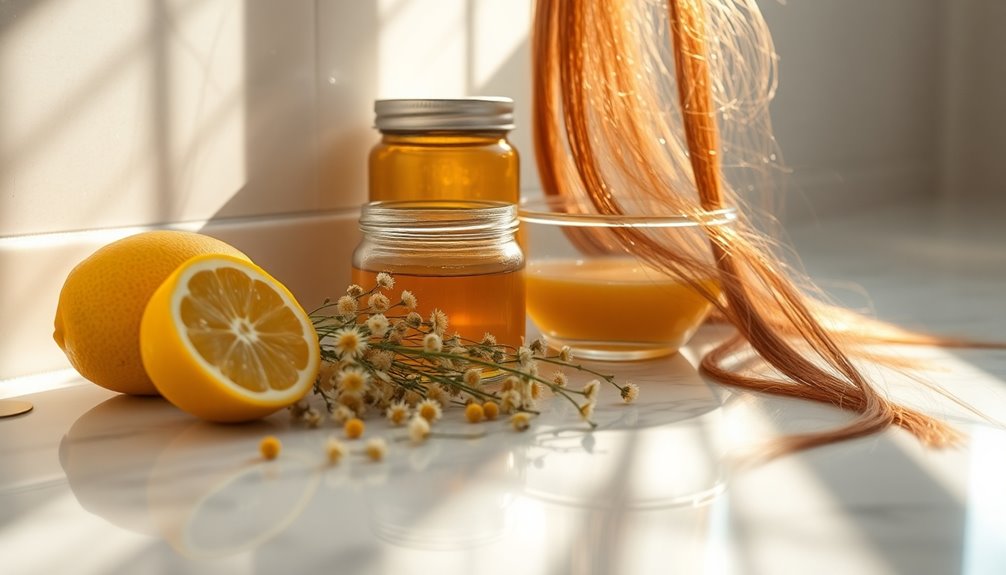
Understanding your hair type is essential for achieving the best results with natural lightening methods. If you have dark brown or black hair, you mightn't reach blonde tones; instead, expect warmer reddish or copper undertones.
Lighter hair typically shows more noticeable results, while dark shades may only see subtle changes. The texture of your hair also matters—fine hair tends to lighten more readily than coarse hair, which can resist change.
Remember, natural lightening methods can reveal underlying pigments; light brown hair may turn golden, while darker shades could show rich hues.
Consistency and patience are key, as you'll likely need repeated applications over time to achieve your desired effects without damaging your hair.
Why Consulting a Professional Can Be Beneficial
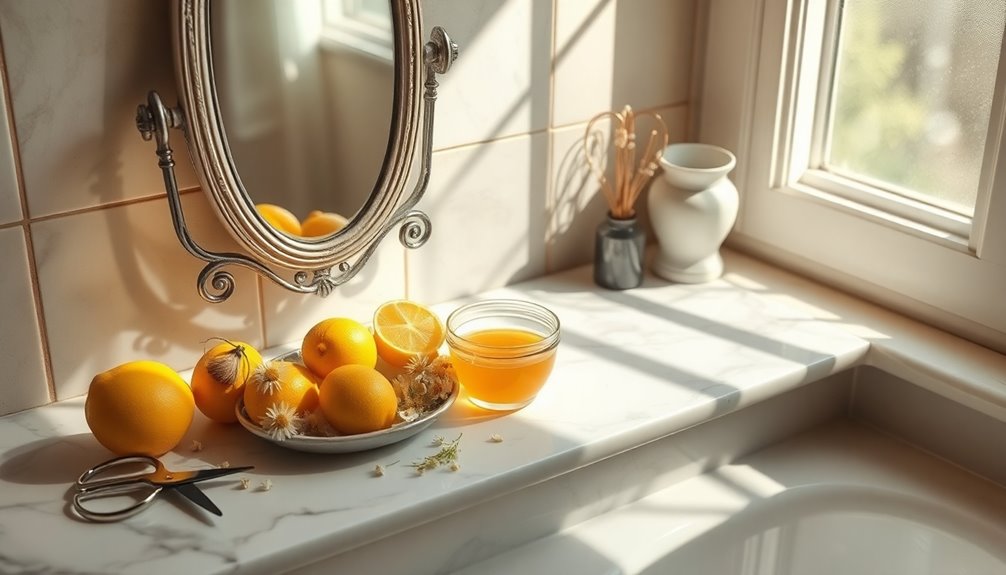
Choosing to lighten your hair naturally can be an exciting journey, but it's wise to contemplate the advantages of consulting a professional stylist. By doing so, you can guarantee a customized approach tailored to your hair type and condition, minimizing damage risks.
Professionals offer:
- Access to higher-quality products and techniques
- Thorough assessment of your hair health
- Regular monitoring of your hair's progress
- Expert guidance to avoid over-processing and undesirable results
Consulting a professional not only enhances your lightening experience but also safeguards your hair's integrity.
With their expertise, you can achieve your desired look safely and effectively, making the process smoother and more enjoyable. Don't hesitate to seek help for best results!
Frequently Asked Questions
What Is the Most Effective Natural Hair Lightening?
If you're looking for the most effective natural hair lightening method, consider using lemon juice. Its acidity lifts color, especially for light or blonde hair, when applied and dried in the sun.
For brunettes, mix chamomile tea with lemon juice for a golden hue.
Honey is another great option, providing gentle lightening over time.
Just remember to combine treatments wisely and test them first to avoid any potential hair damage.
Does Hydrogen Peroxide and Baking Soda Lighten Hair?
Imagine your hair as a canvas, waiting for a splash of light. Yes, hydrogen peroxide and baking soda can lighten your hair.
When you mix them, they work together like an artist with a brush, lifting dark tones from your strands.
Just be careful; if you leave the paste on too long, it can harm your hair. Rinse well afterward, and don't forget to condition it to keep your locks healthy and vibrant!
Does Vinegar Lighten Hair?
Yes, vinegar can lighten hair, especially apple cider vinegar.
You can mix equal parts of vinegar and water, then apply it to your hair. Its acidic properties help adjust your hair's pH, leading to a natural lightening effect.
For better results, try using it in the sun, but keep an eye on your hair's condition.
How Can I Lighten My Hair Fast Homemade?
If you want to lighten your hair quickly at home, try a few simple methods.
Mix one part lemon juice with two parts water, apply it, and sit in the sun for an hour.
Alternatively, combine honey and cinnamon, leave it on for an hour, or dissolve salt in water, apply it, and sunbathe for 20 minutes to an hour.
Baking soda paste can also brighten your hair when applied for 20 minutes before rinsing.
Conclusion
In your quest for sun-kissed locks, remember that nature's bounty can work wonders. By using everyday ingredients and following the right methods, you can achieve a lighter shade without harsh chemicals. Just like a delicate flower bending towards the sun, your hair can brighten beautifully with the right care. So, embrace these natural lightening techniques, but don't hesitate to reach out to a professional if you're unsure. Your hair deserves the best, after all!
